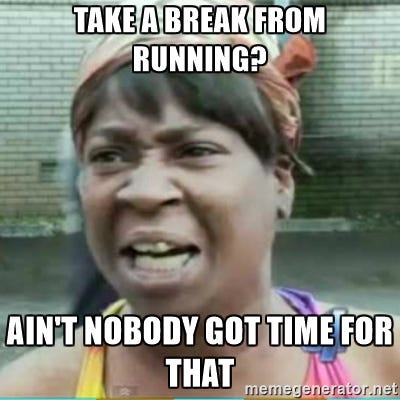Morning Finishers,
Today’s topic might possibly be the most important one we’ve covered to date. Before diving in though, I want you just to think for a second about your last week of training.
Was it a good week, or did we miss a few workouts?
Did you feel good about your results, or are you starting to slow down?
Are you feeling fresh after a rest day, or are you constantly sore?
Do you look forward to running?
Do you know why you’re running?
The act of running is a form of stress. It’s a stress on your body, your mind, your time, and probably even more aspects of your life. No matter who you are, or how experienced you are at running this stress compiles over time and eventually starts to take a toll. So today, we’re going to have a little conversation about overtraining and why sometimes NOT running is just as, if not more, important than actually running.
What do you mean by overtraining?

If your answers to the above questions are leaning negative, then it might be time to take a chill pill and slow down the training bit. Overtraining is something that every distance runner comes face to face with at some point in their journey. While the point of burnout might look different for each person, I think it can best be described as:
When training exceeds the amount your body can handle without proper recovery
The proper term for overtraining is actually Unexplained Underperformance Syndrome and its symptoms can be classified under two different categories: Physical symptoms and Mental symptoms.
Physical symptoms of Overtraining
For the physical side of things, let’s consider weight lifting. When you lift weights, your muscles contract and cause damage to your existing muscle fibers (why you get sore). Once the muscle is at rest, your body repairs the muscle to be even larger than it was before. This is called Muscular Hypertrophy. In order for this growth to happen though, you need to give your muscles the opportunity to rest. Without rest, your muscles stay damaged and you’re left with zero gains and lots of soreness.

Sames goes for running. When you train, you are adding damage to your body at a significantly high rate. You need to give your body that time to rest, otherwise, you’re progress will go nowhere, and may experience some of the following:
Chronic fatigue
Elevated rested heart rate
Lack of sleep
Lack of appetite or weight loss
Increased susceptibility to sickness
Constant soreness
Decrease in Performance
Mental symptoms of Overtraining
The mental effects of overtraining are also something to be aware of. Sometimes, it’s not physical pain we feel, but a constant cycle of stress and anxiety that hinders our ability to train effectively. This can happen in a myriad of different ways. For me, the big drivers of mental exhaustion are monotony, lack of progress, and unnecessarily high expectations.

As you might have already figured out, running can get really repetitive. it’s easy to fall into a cycle of running the same routes, at the same pace, at the same time, and repeating that over and over. When you first start running, everything is new and exciting. You hit a new personal record every week, experience new sights and sounds on your route, and just feel so excited and productive with your new-found passion.
As you get stronger and faster over time though, the PR’s don’t happen quite as often. You run out of new places to run and are stuck doing the same route every day. It can start to get boring, and all of a sudden staying in bed and sleeping sounds like a way better time than going out and getting it done.
Or maybe you’re just busy right now. It’s possible that work is kicking your butt, and you just need a little bit of sleep. Maybe the heaviness of this year is weighing you down, and you just need some time to breathe. Whatever the case may be, we MUST take inventory with our how our mind is doing, and ensure that we aren’t running ourselves straight into a mental breakdown.
5 Ways to Avoid Overtraining
So there is good news and bad news with this.
The bad news is that at some point (and probably multiple points) in your training, you’re going to experience a bit of burnout.
You’re a highly driven individual with dreams, and you’re going to push yourself hard in order to achieve them. You will hit a tipping point and you will get frustrated. That’s just part of running!
Worry not though, because the goods news is that you can pull yourself out of this.
Remember that your excitement for running will ebb and flow with what’s going on in your life. If you currently feel stuck in your training and way to break the cycle of frustration, listen up. These are things you NEED to do to get back to being excited about running again.
Take A Break

Often times, this doesn’t feel like an option for people. Despite feeling stressed, exhausted, sore, or just in a funk, the idea of NOT running seems ludicrous. Here’s a news flash for you: You aren’t going to run every week for the rest of your life. It’s just not possible!
It’s completely okay to give your body a few days, weeks, or even a month off from pounding pavement all the time. Be honest with yourself. If you’re at a point where you feel like you need the time, TAKE THE TIME. You’re training is going to gain more from having a sound mind and body than it will lose from not running for a little bit. Taking a break is ayokay, don’t think that it isn’t.
Revisit your “Why?”
Why am I doing this? This is the most valuable question we can ask ourselves when evaluating what is important in our lives. If something has a strong “why” behind it, that thing evolves into a priority. When the “why” is less clear, it becomes less deserving of our time and energy.
Why are you running? Do you know? Are you in this for yourself, or are you feeling pressure from the outside? Spend some thinking about your “why” and decide if you have one, or you’re still searching for it.
Make a change
One change to your routine could be the breath of fresh air you need to get out of a funk. If you’re tired of doing the same thing every time…STOP! You’ve got lots of options to spice things up a bit. Find the thing that excites you the most, give it a shot, and find other ways that put fun back into your training.
Re-route your runs
Switch things up by running somewhere new. Don’t be afraid of driving a little bit to run somewhere that might put a smile on your face!
Swap out your music
Listen to something new on the run. Trade your music in for an insightful podcast, or dive into a new story with an audiobook.
Invite a friend along
Everything is better with friends. Schedule a weekly run with a buddy and hold each other accountable to show up!
Get a new outfit
Ever heard the saying, “look good play good?” Perhaps a small shopping spree for running clothes is exactly the motivation you need to get back to the grind (lululemon anyone?)
Take a trip, back your running shoes
This one is really effective for me. Traveling is a big passion of mine, and over the years I’ve realized that running is one of the best ways to explore a new place. I always catch myself falling back in love with running when I get to explore a brand new environment, and I plan on scheduling more running vacations in the future.
Prioritize Recovery
Take your rest days seriously, your training depends on it! Rest days are not days for long hikes or squats at the gym. Spend your rest days off your feet, and give them the proper TLC they need to bounce back and get back to it later in the week.
Give your body the proper amounts of protein it needs to patch up your muscles and get them ready to run. The Recommended Dietary Allowance (RDA) for athlete protein intake is anywhere from 1 to 1.6 grams per kg of body weight (or ~2 lbs). You wouldn’t expect your car to run without gas, so don’t expect your body to run without fuel either!
Set a goal
Here’s what I’ve learned about myself when it comes to running motivation. If I don’t have a goal to work towards, I ain’t gonna do it.
Often times, your “why” is related to this goal, but goes a bit deeper. For me, my GOAL right now is to run a 100-mile race before the end of next year. But that is not why I run.
My “why” is redefining my own impossible. I feel most accomplished when I push myself to the edge and achieve something greater than I ever thought possible for myself. This “why” fuels my desire to run each and every day, and is the reason I have a goal to run 100 miles.
What goal is going to help you chase your “why”? Goals could be running 3 time a week for the next month, breaking a certain time goal, or trying to complete a marathon! Your goals should be tangible (something that has an end), and something you’re excited to pursue. Give yourself something to look forward to, and track your progress along the way.
Take Care of Yourself
Everyone deals with burnout, and everyone has their own way of breaking out of it. Whether you leverage some of the advice I gave above or find something else that works for you, what’s important is that you never give up.
You’re doing really great, and stepping away for a bit to take care of yourself isn’t going to take away from all the work you’ve put in. Take a deep breath, take the time you need when you need it, and get yourself ready to come back better than ever.
Best,
Zack

New to M1F?
My First Finish is an online running platform that helps people achieve their running goals. We provide fully customized training plans, daily accountability, and a supportive community of runners to help you unlock your fullest potential. If you have dreams of running a half / full marathon, or just want to make running a part of your life, you can signup for free.



